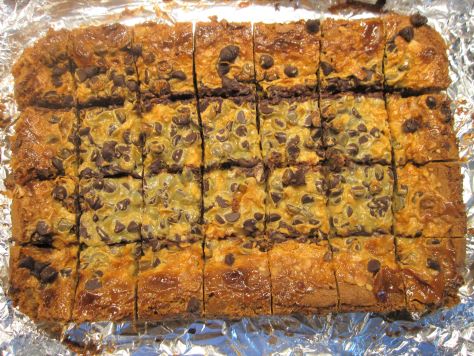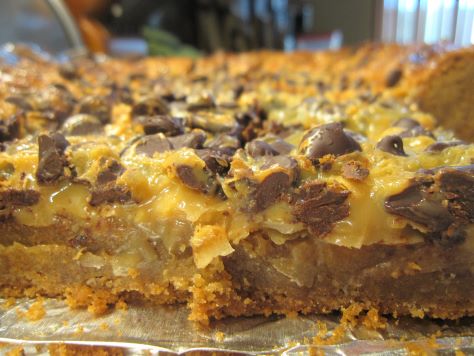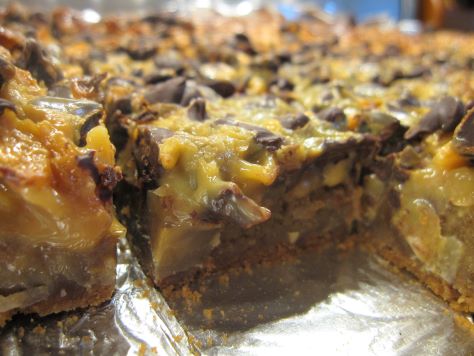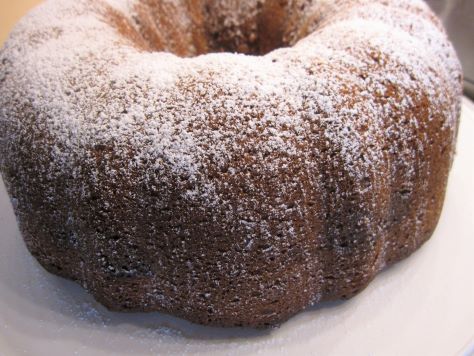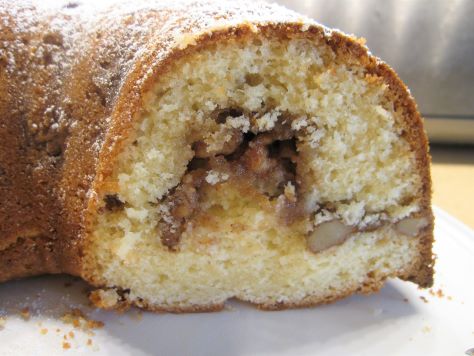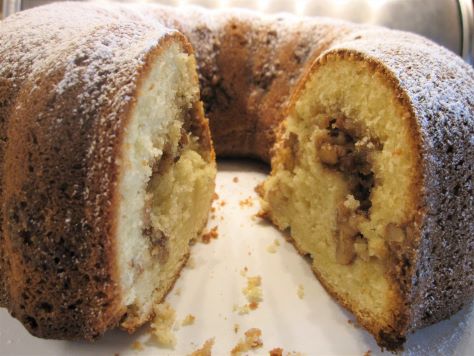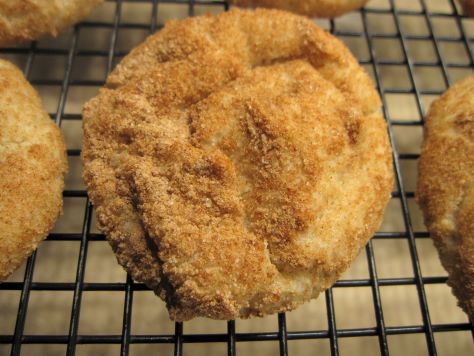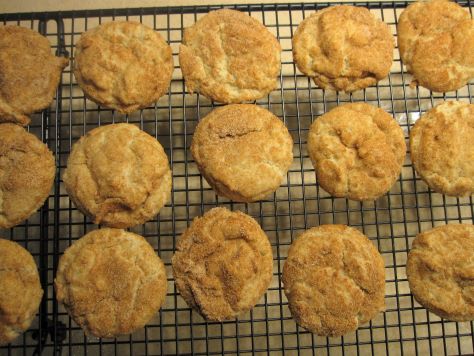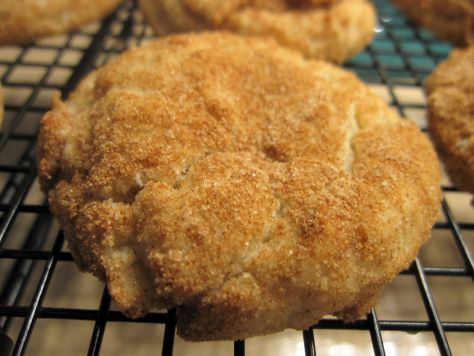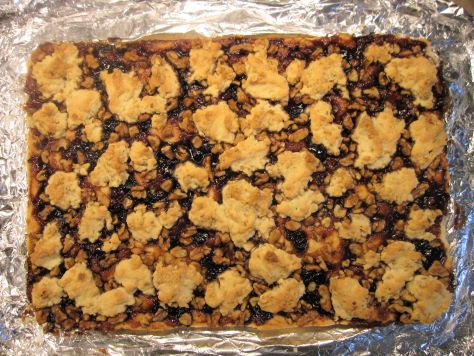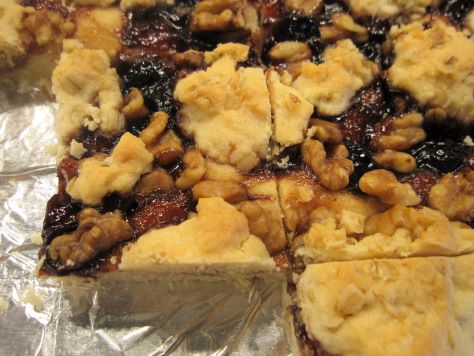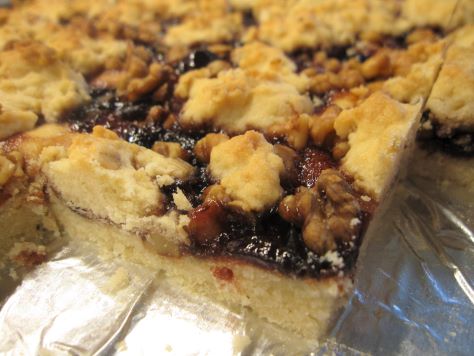Bready or Not: Browned Butter Lamington Blondies
These Browned Butter Lamington Blondies are rich and indulgent, all chewy, chocolaty and good.
A lamington is an Australian dessert wherein pieces of sponge cake are rolled in chocolate and coconut. I haven’t gotten to try the real thing, but I can vouch for the fact that this home-baked version is delicious.
You start out with a blondie base that is rich on its own, with bountiful butter, brown sugar, vanilla, and eggs. Then you go even more ultra by adding an ooey-gooey chocolate and coconut-laden topping.
The original version of the recipe, in the Bake from Scratch May/June 2019 issue, proposed this Lamington version as a modification for a standard Blondie recipe. I rewrote it to streamline the process and change out some ingredients. Like… this doesn’t need sweetened coconut. It’s already sweet enough!
As I live in Arizona and have a warm kitchen, I found it essential to chill these bars so that they could be sliced up. I stored them in the fridge afterward as well, but if you’re in a cooler area, that likely isn’t needed.
Bready or Not: Browned Butter Lamington Blondies
Equipment
- 13×9 pan
- uneven spatula
Ingredients
Blondie Base
- 1 1/2 cups unsalted butter 3 sticks
- 3 cups light brown sugar packed
- 2 teaspoons baking powder
- 1 teaspoon kosher salt
- 4 large eggs room temperature
- 1 Tablespoon vanilla extract
- 3 cups all-purpose flour
Topping
- 1 cup unsweetened flaked coconut
- 1 cup bittersweet chocolate chips
- 14- ounces sweetened condensed milk
Instructions
- In a medium saucepan, melt butter over medium heat, stirring often until butter turns golden-brown with a nutty aroma, about 5 to 10 minutes. Pour into a small bowl to let stand at room temperature while the next steps are prepared.
- Preheat oven at 350-degrees. Line a 13×9 pan with foil and apply nonstick spray or butter.
- In a large bowl, beat together the brown sugar, baking powder, and salt. Beat in the browned butter. Add eggs one at a time, scraping bowl after each addition. Add vanilla extract. Fold in flour until just combined. Pour into prepared pan, evening out with an uneven spatula.
- Bake for 30 minutes. Middle needs to be set or the toppings will sink. Once that is done, no need to cool the base layer–remove the pan from the oven and sprinkle coconut over the top followed by the chocolate chips. Pour the sweetened condensed milk all over both.
- Place pan back in oven to bake for 20 to 25 minutes, until middle is molten. Let cool for a while at room temperature, then place in fridge to completely set and chill.
- Use foil to lift contents onto a cutting board. Slice. Store individually wrapped-up or in a sealed container at room temperature or in the fridge for up to 3 days.
OM NOM NOM!
Bready or Not: Walnut Streusel Coffee Cake in a Bundt Pan
Coffee Cakes can be delicious but so very messy to eat. This bundt cake version turns things inside out by putting the ‘messy bit’ inside the cake, making for easier yet still scrumptious eating.
The most negative thing I can say about this Walnut Streusel Coffee Cake in a Bundt Pan is that it dirties a lot of dishes. So yeah, there is some effort involved, but the result is well worth it!
I individually wrapped slices of this for my husband to take to work. He had a co-worker tell him this cake was “f—–n’ awesome.” I take that as high praise.
This would be a great cake to make a day-ahead for a breakfast or brunch for a lot of people!
Bready or Not: Walnut Streusel Coffee Cake in a Bundt Pan
Equipment
- large bundt pan
- nonstick spray with flour
- mixer
Ingredients
Candied Walnut Filling
- 1 cup walnuts chopped
- 1/2 cup light brown sugar packed
- 2 Tablespoons unsalted butter melted
- 1/2 teaspoon ground cinnamon
Coffee Cake
- 4 large eggs separated
- 1 cup unsalted butter room temperature
- 1 3/4 cups white sugar
- 1 teaspoon vanilla extract
- 3 cups all-purpose flour
- 2 teaspoons baking powder
- 1/2 teaspoon baking soda
- 1/4 teaspoon salt
- 1 cup sour cream or vanilla or plain Greek yogurt
- confectioners' sugar to dust on top, optional
Instructions
- In small bowl, combine the walnuts, brown sugar, butter, and cinnamon, tossing to coat well. Set aside.
- Separate eggs, placing the whites in a large bowl. Let them come to room temperature for about 30 minutes.
- Preheat oven at 350-degrees. Use nonstick spray with flour on a large bundt pan.
- In a big mixing bowl, cream the butter and sugar together, making them light and fluffy. Add egg yolks one at a time. Add vanilla.
- In a separate bowl, combine flour, baking powder, baking soda, and salt. Add the dry ingredients to the butter mix alternatively with the sour cream, scraping the bowl on occasion, until just combined.
- Using clean beaters, beat the egg whites on medium until stiff peaks form. Fold the whites into the batter, making sure not to overmix and deflate.
- Pour half the batter into the bundt pan. Sprinkle the walnut mixture fully around the ring. Pour the rest of the batter on top and smooth out.
- Bake cake for 45 to 55 minutes, plunging a toothpick in the middle of the cake to test for doneness. Cake is done when the toothpick comes out clean. Cool for 20 minutes, then invert onto a rack to completely cool.
- If desired, sprinkle confectioners’ sugar over the top prior to serving. Cake is best eaten within two days, but can also be individually sliced, wrapped, and frozen to enjoy later.
OM NOM NOM!
Publications from Summer 2022
Well, hi. There hasn’t been anything but scheduled-ahead Bready or Not posts over the past while because I have been in DEADLINE LAND. Deadline Land is a nightmarish place where you don’t leave the house except to acquire groceries and get your kid to therapy, and you write and write and write and panic and write some more AND THEN you get copyedits for another book and you then quietly scream.
I’m still in Deadline Land but the landscape has changed enough to grant me some catch-up time to update my bibliography and also compile those changes in this very post. Along with the new short stories, poems, and podcast linked below, I can also say that my book A Thousand Recipes for Revenge is now scheduled for release on June 13, 2023. I hope to have a cover to share soon!
New Short Stories
“Prognostiqueso,” Daily Science Fiction
“The 207th Time I Went Back to March 9, 1980,” Uncanny Magazine Issue 48 (Sept/Oct 2022)
“How to Creatively Host Cheese Parties During and After the Apocalypse,” Hexagon Magazine
“A Light in the Garden,” Nature
Poetry
“Only Times,” Eye to the Telescope #45
“When As An Adult, You Choose to Again Believe in Magic,” The Magazine of Fantasy & Science Fiction July/August 2022
“In Spring, We Thanked the Wee Folk,” Kaleidotrope (Summer 2022)
“The Ship is Wrong,” Felis Futura [Amazon Affiliate link]
Podcast
“Consider the Monsters” (reprint), Manawaker Studio’s Flash Fiction Podcast
#SFWAPro
Read MoreBready or Not: Banana Snickerdoodles
Bready or Not is all about different Snickerdoodle recipes, and this one is especially unique: Banana Snickerdoodles!
I found the original version in in the May/June 2019 issue of Bake of Scratch, in a fascinating article on bakeries and baked goods in Bermuda. I had to give it a try, with some tweaks throughout the process.
These cookies feature the necessary cream of tartar and cinnamon-sugar coating, plus they look like Snickerdoodles should with a crackled top. The texture is different, though—a bit fluffier, and the banana flavor is light and pleasant.
The dough is also stickier to work with. I didn’t have big issues with that, but if you do, lightly flour your hands to make the dough workable.
Bready or Not: Banana Snickerdoodles
Equipment
- baking sheet
- parchment paper
- tablespoon scoop
Ingredients
Dough
- 1 cup unsalted butter (2 sticks) room temperature
- 1 1/2 cups white sugar
- 1 teaspoon vanilla extract
- 2 large eggs room temperature
- 3/4 cup banana puree 2 medium bananas
- 4 1/2 cups all-purpose flour
- 2 1/2 teaspoons cream of tartar
- 1 1/2 teaspoons baking soda
- 1/4 teaspoon sea salt
- 1/4 teaspoon ground cinnamon
Topping
- 3/4 cup white sugar
- 1 1/2 Tablespoons ground cinnamon
Instructions
- Preheat oven at 350-degrees. Line a baking sheet with parchment paper.
- In a big bowl, beat the butter and sugar until fluffy. Add vanilla, then eggs one at a time. Mix in the banana puree.
- In a separate bowl, stir together flour, cream of tartar, baking soda, salt, and cinnamon. Gradually beat the dry ingredients into the wet. The dough will be somewhat sticky. Mix the two topping ingredients in a small bowl.
- Use a tablespoon scoop or spoon to shape a small ball of dough. Roll it in the cinnamon-sugar then place on baking sheet. Repeat, spacing out coated dough balls.
- Bake for about 10 to 12 minutes, until they are puffed with a crackled top. Let cool on pan for 5 or 10 minutes before moving them to a rack to completely cool. Store in an airtight container at room temperature.
OM NOM NOM!
Bready or Not Original: Fruity Pastry Bars
These Fruity Pastry Bars are the perfect treat for a crowd. This recipe makes a nice big pan to share with others!
When I make bars like this, I’m always worried about how crumbly they will be. I can report that, at least for me, these were surprisingly durable bars that could even be held in the hand when eating. They barely crumbled when they were cut.
I love how they can be customized, too. You can use all sorts of berry preserves; these pictures depict Bonne Maman Cherry Preserves. The rich, bold flavor is lovely with the buttery crust, while the nuts add a great textural contrast. Of course, you could substitute different nuts like sliced almonds, or omit them entirely.
Bready or Not Original: Fruity Pastry Bars
Equipment
- jelly roll pan
- aluminum foil
- nonstick spray
Ingredients
Bars
- 1 1/2 cup unsalted butter (3 sticks) room temperature
- 1 1/4 cups white sugar
- 2 large eggs room temperature
- 1 teaspoon vanilla extract
- 1 teaspoon salt
- 3 1/2 cups all-purpose flour
Topping
- 12 to 13 ounces fruit preserves such as strawberry, cherry, or raspberry
- 1 cup chopped walnuts
- 1/4 cup quick oats
Instructions
- Line a jelly roll pan with a large piece of aluminum foil. Apply nonstick spray or butter. Preheat oven at 350-degrees.
- In a large bowl, cream together the butter and sugar until light and fluffy. Beat in eggs and vanilla. Gradually mix in the flour and the salt. Batter will be very thick. Grease a hand and use that to pat down about 3/4 of the dough into the bottom of the pan.
- Wash hands. Spread preserves over the dough. Sprinkle the walnuts over the top. Add quick oats to the reserved dough. Place small handfuls of dough spaced out over the top.
- Bake for about 35 minutes, until top is set and doesn’t jiggle in middle. Cool completely, speeding process in fridge if desired. Use foil to lift contents onto a cutting board to slice into bars. Store in a sealed container. Bars can also be frozen for later enjoyment.




